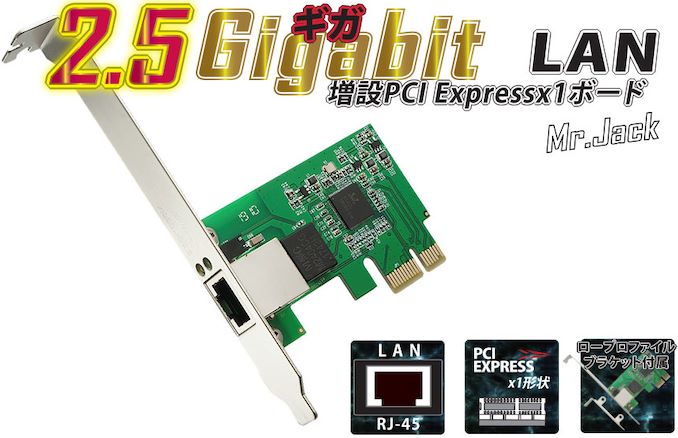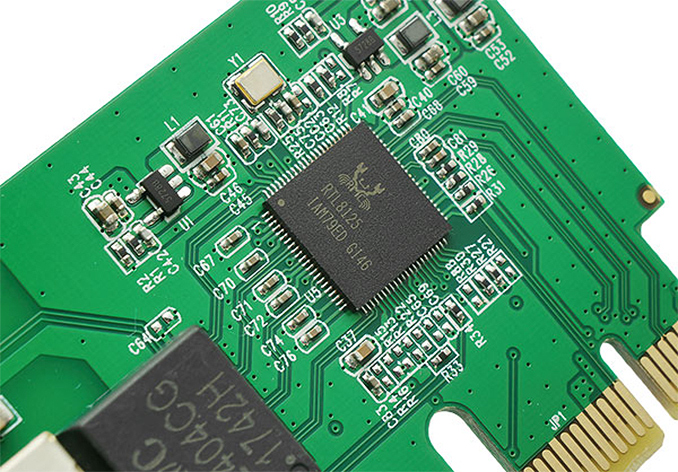Realtek 2.5 GbE PCIe Cards Now For Sale
by Anton Shilov on October 24, 2019 4:00 PM EST- Posted in
- Networking
- Realtek
- 2.5GBase-T
- Ethernet
- 2.5 GbE

A Japanese company has started sales of its 2.5 GbE network card that uses a Realtek controller. The adapter is a low-profile PCIe 2.0 x1 board that is compatible with the vast majority of desktop PCs that are used today. However, it isn't as cheap as one might expect.
The 'Area Mr. Jack' 2.5 GbE LAN (SD-PE25GLAN-1L) network adapter is a low-profile PCIe 2.0 x1 card based on Realtek’s RTL8125 controller launched over a year ago and currently used on some motherboards. Measuring 80 mm by 44 mm, the card is very small and simplistic, it has one RJ-45 connector and is equipped with two status LEDs. Besides 2.5 GbE (IEEE802.3bz 2.5G BASE-T) over conventional Cat5/Cat6 cables, it supports previous-generation protocols too, including 1 GbE and below. For OS compatibility, the NIC comes with drivers for Windows 7/8/8.1/10, whereas the status of Linux support is unclear.
The Area Mr. Jack 2.5 GbE LAN card costs ¥3,980 including tax ($33.30 without VAT), which is not a particularly low price considering the fact that GbE ports are ‘free’ with most motherboards and Aquantia-based 5 GbE and 10 GbE cards can be bought for $70 and $90, respectively. Also, as there are no cheap 2.5 GbE and 5 GbE switches on the market yet, one will have to use a multi-mode 2.5/5/10 GbE switch, which is not cheap as well, so using 2.5 GbE cards instead of faster options may not be that economically viable.
But there is a catch about this card: it only uses a PCIe 2.0 x1 slot. It can be installed into every desktop with a spare PCIe 2.0 x1 slot, which essentially means any desktop launched in the last 10+ years as well as low cost systems that only come with PCIe 2.0 x1 slots. By contrast, 10 GbE cards come with a PCIe 3.0 x4 interface, whereas 5 GbE cards feature a PCIe 3.0 x1 interface, something that the cheapest PCs based on Intel’s H110 and similar chipsets does not support.
Related Reading:
- Things We Missed: Realtek Has 2.5G Gaming Ethernet Controllers
- Intel Quietly Mentions 2.5 GbE Ethernet Controllers
- Aquantia Multi-Gig: Single Chip USB 3.0 to 5G/2.5G Dongles Coming Soon
- Club 3D Launches 2.5 GbE USB Type-A & USB Type-C Dongles
Source: Area (via Akiba PC Hotline)











53 Comments
View All Comments
monsted - Thursday, October 24, 2019 - link
The last paragraph makes little sense. This card works in any PCIe slot, just like any other PCIe card would. PCIe is backward and forward compatible by definition. The only limitation is the speed of the slot and even a PCIe 1.0 x1 slot would support the 2.5 Gbps this card needs (maybe ever so slightly below optimal speeds because of overhead). A 3.0 (or 4.0) x1 card would do that just as well.sheh - Thursday, October 24, 2019 - link
Yeah, unclear. PCIe 2.0 x1 is exactly what this card needs. PCIe 1.0 is 2Gbps after encoding overhead.I also don't get the statement about the price:
"not a particularly low price considering the fact that GbE ports are ‘free’ with most motherboards and Aquantia-based 5 GbE and 10 GbE cards can be bought for $70 and $90"
2.5Gbps ports are hardly common on motherboards, and $35 is half or less the price of 5-10Gbps cards.
engineer_grunt - Thursday, October 24, 2019 - link
Working at RealTek I can tell you this is the typical bottoms up approach to market share acquisition. The goal is to get the lowest common denominator at no cost adder late market advantage. Intel is introducing 2.5Gbe as a standard speed in upcoming products and most WiFi extenders are requiring 2.5Gbe as well as not needing to changing cables.10Gbe/5/2.5/1 N-Base-T solutions came from the top down infrastructure equipment vendors like Aquantia and now merged with Marvell. Those solutions require 10.3125 Gbps SERDES so for power and area this is a cost concern as well.
The good news is that 2.5Gbe will be nearly free in upcoming designs over the next year or two for consumers. If you want higher speed other vendors already supply 10Gbps solutions like the AQR113 but draw typically 3Watts of power just for the PHY.
-Engineering Grunt
GreenReaper - Thursday, October 24, 2019 - link
Linux 5.4-rc1 has support for the RTL8125 controller in the r8169 (RTL8169) driver.8181244b-24ac-73e2-bac7-d01f644ebb3f@gmail.com/" target="_blank" rel="nofollow">https://lwn.net/ml/netdev/8181244b-24ac-73e2-bac7-...
https://www.spinics.net/lists/netdev/msg602045.htm...
https://github.com/torvalds/linux/commits/master/d...
There also appears to be a driver for 2.4 and 2.6 kernels (used by OpenWRT?) here:
https://github.com/heri16/r8125
GreenReaper - Thursday, October 24, 2019 - link
Looks like Ars Technica's URL filter combines unfavourably with its email address filter...GreenReaper - Thursday, October 24, 2019 - link
Or Anandtech, even. (What I get for opening the tabs next to each other at 4AM! :-)yetanotherhuman - Friday, October 25, 2019 - link
Great. But why aren't there tons of cheap 5/2.5Gbit switches around alreadyimaheadcase - Friday, October 25, 2019 - link
Why does anandtech keep saying no cheep 2.5GbE switches out? They have been for years cheap enough out. Are they copy and pasting info from years past or something?Sure not cheap if you go 8+ ports, but plenty around $200 mark for less ports.
RSAUser - Friday, October 25, 2019 - link
A $200 switch is not cheap, all 3 of my 1Gbps switches + access points are about $180 in total.Yes, I get 1Gbps on everything, including WiFi if ac support on the device (so pretty much all my devices besides the TV).
Most of my stuff is the Tenda line, seem to be the best budget option here.
R3MF - Friday, October 25, 2019 - link
Q - Is there any indication yet whether it is 2.5Gb or 5Gb that will win out as the mass-market standard for consumer gear?Because it will be one or the other, probably depending on whether 5Gb gear can be marketed at a price only marginally higher than 2.5Gb...